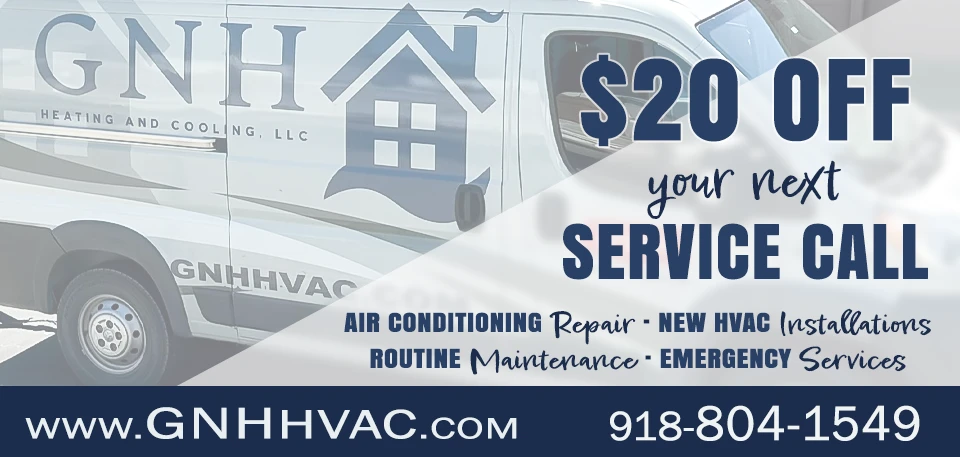Your air conditioner’s making that weird grinding noise again. You know, the one you first noticed three weeks ago but keep telling yourself isn’t that bad since cold air’s still coming out?
We see this all the time here in Tulsa. Homeowners often cross their fingers, hoping that a rattling compressor or sluggish startup will magically fix itself. Spoiler alert: it won’t. And that “wait and see” approach? It’s about to cost you way more than you think.
Why We All Do This to Ourselves
Let’s be honest: nobody wakes up excited about HVAC repairs. When life gets hectic and budgets feel tight, it’s easy to rationalize putting off that service call. Your brain starts making deals: “It’s still working, so it’s probably fine.” “I’ll call someone after the holidays.” “Maybe if I just ignore it, the problem will go away.”
Sound familiar? You’re definitely not alone. But here’s what we’ve learned after years of working on Tulsa’s HVAC systems: that $250 fix you’re avoiding today has a nasty habit of turning into a $4,000 emergency tomorrow.
Take Mrs. Johnson over in Turley. She heard her air conditioner making clicking sounds but figured it wasn’t urgent since her house stayed comfortable. A month later, that clicking turned into complete compressor failure. What started as a simple capacitor replacement became a $3,200 repair bill, and three days without AC during July.
Your Electric Bill Tells the Real Story

Want to know the fastest way to spot HVAC trouble? Look at your PSO bill. When systems start struggling from dirty coils, low refrigerant, or worn-out parts, they have to work overtime just to keep up.
Even minor efficiency drops can bump your energy costs 15-20%. During Tulsa’s brutal summers, when temperatures soar to 95 degrees for weeks on end, that extra strain can easily add $200-300 to your monthly bill. Do that math over a whole year, and you’re talking serious money.
We had a customer in Owasso who ignored slow cooling all through last July. His electric bills jumped from $280 to $400 per month. When we finally got out there, we found refrigerant leaks and dirty coils that had been forcing his system to run almost constantly. A $250 repair would have saved him over $600 in wasted electricity.
How Small Problems Snowball Fast
Here’s the thing about HVAC repairs: they follow a domino effect. One failing component stresses the next, which damages another, until you’ve got a full-blown system crisis on your hands.
- Dirty filter: The blower motor starts working harder and running hotter.
- Overheated motor: Burns out the capacitor.
- Failed capacitor: Damages the compressor.
Suddenly, your $30 filter replacement has turned into a $4,800 repair bill.
When Comfort Takes a Hit
Struggling HVAC systems don’t just cost more, they perform worse. You’ll start noticing hot and cold spots throughout your house. The master bedroom becomes a sauna while the living room stays chilly. Humidity gets wonky, leaving some rooms feeling like a swamp and others bone dry.
If you’re working from home, poor temperature control becomes obvious. It’s hard to focus when you’re constantly adjusting the thermostat or moving to different rooms to find comfort. At night, an inconsistent system can leave you tossing and turning, trying to find the right temperature for decent sleep.
Plus, there’s the noise factor. Failing components get loud. That gentle hum becomes grinding, banging, or squealing that you can hear throughout the house. Some of our customers tell us they’ve started sleeping with fans or white noise machines just to drown out their HVAC system.
The Health Stuff Nobody Talks About
Delayed HVAC maintenance isn’t just about comfort and money, it can actually affect your family’s health. Dirty systems circulate all kinds of nasty stuff: dust mites, mold spores, pollen, and bacteria. If anyone in your house deals with allergies or asthma, a neglected HVAC system can make symptoms much worse.
Moisture problems are especially concerning here in Oklahoma. Our humidity can create perfect conditions for mold growth inside ductwork. We’ve seen cases where families were dealing with persistent respiratory issues that cleared up completely once we cleaned and repaired their HVAC system.

When Systems Fail at the Worst Times
HVAC equipment has terrible timing. Systems often fail when needed most, such as during Tulsa’s 100-degree summer heat waves or when winter ice storms disrupt power and strain heating systems.
Unfortunately, these peak demand periods are also when repair companies get swamped. Wait times stretch to several days. Parts become harder to find. Emergency service rates kick in for nights, weekends, and holidays. What might have been a routine $400 repair during mild weather becomes a $3,000 emergency job when demand spikes.
We had a customer whose AC died on the first day of a week-long heat wave last summer. Every HVAC company in town was booked solid. They ended up paying premium rates for emergency weekend service, plus the cost of hotel rooms for three nights while waiting for parts. The total bill hit over $3,000 for a problem that would have cost a tenth of that to fix the month before.
Property Damage Nobody Sees Coming
Some HVAC problems don’t stay contained to the equipment. Refrigerant leaks can corrode nearby metal and damage flooring. Clogged condensate drains overflow, damaging ceilings and walls. Electrical faults can spark fires that spread beyond the unit.
We once responded to a call where a small refrigerant leak had gone unnoticed for months. The leaked coolant had eaten through copper piping in the walls, requiring extensive plumbing repairs in addition to the HVAC work. The homeowner’s insurance covered some costs, but the deductible and hassle factor made it an expensive lesson.
The Math That Should Scare You
- Refrigerant leak repair: $400-600 early vs. $3,500-5,000 with compressor failure, or $12,000+ for full system replacement.
- Coil cleaning: $200-300 early vs. $1,500-2,000 with freeze damage.
- Air filter replacement: $25 early vs. $800-1,200 for blower motor, $1,200-1,800 for evaporator coil, $2,000+ for compressor.
How to Stop This Madness
The good news? Avoiding these expensive disasters is actually pretty straightforward.
- Pay attention to warning signs: Weird noises, odd smells, uneven temperatures, and rising energy bills are all red flags.
- Change your filters regularly: Set a phone reminder for the first of every month.
- Schedule regular maintenance: Twice a year, spring for AC, fall for heating.
- Consider a maintenance plan: Priority scheduling, discounts, and spread-out costs.
Final Thoughts
Every day you wait to address HVAC problems, you’re rolling the dice. That minor issue you’re living with today will become a significant expense tomorrow. The money you think you’re saving by putting off repairs? You’ll spend it anyway… just more of it, and at the worst possible moment.
Here in Tulsa, we know how brutal our summers and winters can be. Your HVAC system works hard to keep your family comfortable through 105-degree heat and ice storms. The least you can do is give it the maintenance it needs to keep running reliably.
If your system’s been trying to tell you something through strange noises, poor performance, and higher bills, maybe it’s time to listen. A service call today could save you thousands down the road and spare you the misery of dealing with emergency repairs during extreme weather.
Don’t wait until your system picks the worst possible moment to quit. Call GNH Heating & Cooling today at (918) 804-1549 and let us help keep your home comfortable all year long.


